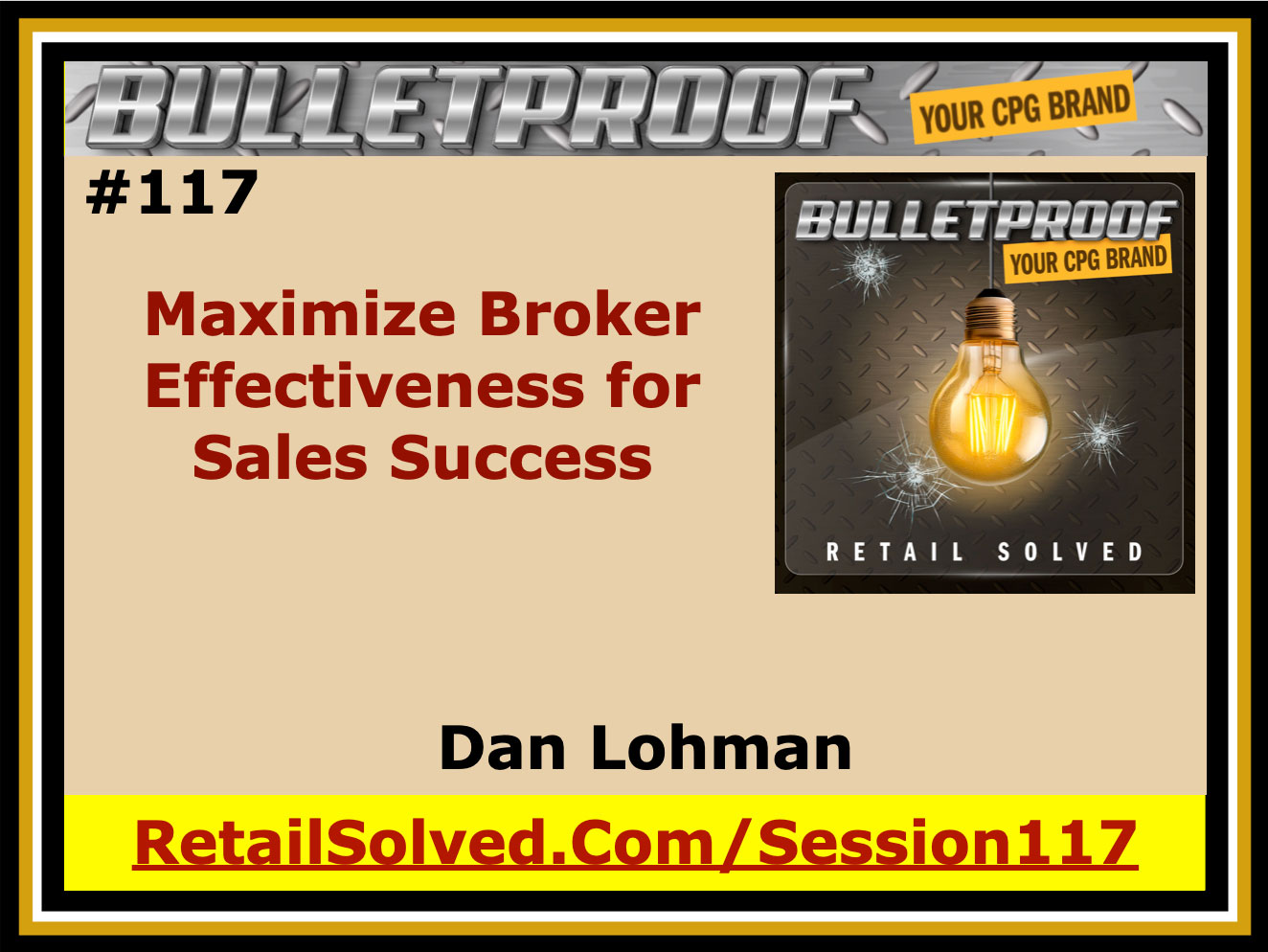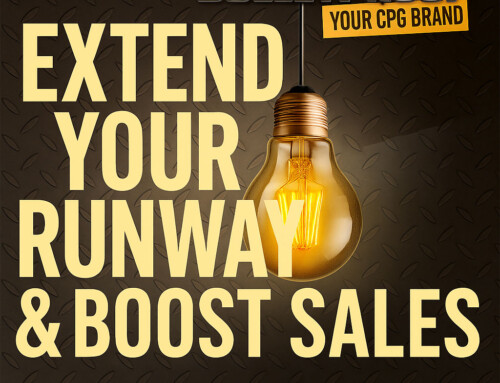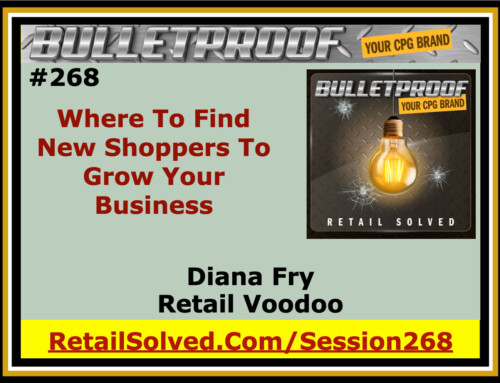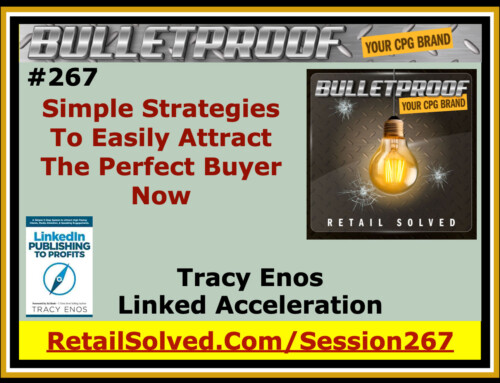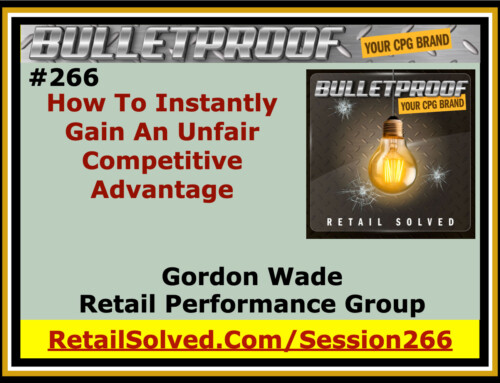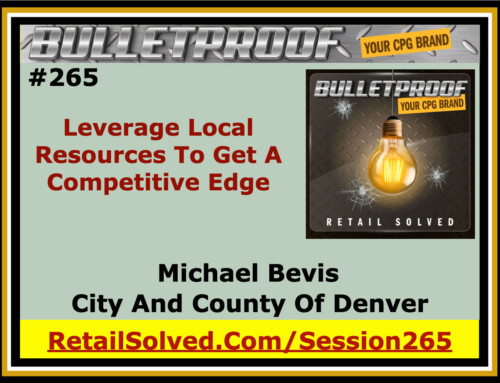Learn how to maximize broker effectiveness with proven strategies that can enhance your sales and brand visibility. Brands should remain fully engaged in their sales strategy and provide brokers with necessary tools and information to succeed. This includes understanding consumer profiles, identifying distribution objectives for each store, highlighting brand attributes, and holding the broker accountable.
Nothing happens until someone buys your product. Getting your brand on more store shelves and into the hands of shoppers is critical to your success. This requires a dedicated sales team all working in unison. Learn key strategies to maximize sales.
Listen where you get your podcast
Important: Brand Secrets and Strategies has been rebranded to Retail Solved. Please swap all BrandSecretsandStrategies.com URL’s with RetailSolved.com. This is now the Bulletproof Your Brand podcast. Thank you for listening! BRAND SECRETS AND STRATEGIES PODCAST #117 Hello and thank you for joining us today. This is the Brand Secrets and Strategies Podcast #117 Welcome to the Brand Secrets and Strategies podcast where the focus is on empowering brands and raising the bar. I’m your host Dan Lohman. This weekly show is dedicated to getting your brand on the shelf and keeping it there. Get ready to learn actionable insights and strategic solutions to grow your brand and save you valuable time and money. LETS ROLL UP OUR SLEEVES AND GET STARTED! Welcome. How do you maximize each and every selling opportunity? I'm just back from Expo West where this was a subject that I was asked about a lot, especially by new and emerging brands. Your entire sales team needs to be in lockstep and they need to communicate your selling story with a unified and consistent voice. This includes both your internal and your external sales team. Several years ago I wrote an article about maximizing broker effectiveness. It led to me being a regular New Hope and Whole Foods Magazine contributor, speaker at the Natural Products Expo and many other events. With over 400 articles published in most all of the leading trade publications, my popular podcasts, weekly newsletter, online mini courses and free resources have become an invaluable resource for brands and retailers seeking to grow sales and gain a sustainable competitive advantage. This is a topic I focus on a lot. The reason for this is that I get asked a lot about this topic when I mentor and work with brands, including on our recent episode of the Brand Secrets and Strategies Podcasts Secrets 89, The Importance Of Having A Solid Digital Brand Selling Story with Madeline Hayden of Nutpods. You're told you need a broker, but do you really know how to work with them to get the best results for your brand? In that article, I focused on leveraging your broker as an extension of your sales team and then holding them accountable for achieving results, same as you would any employee. When I started in this industry decades ago, large brands had a direct sales force. They did everything to drive sales, including all merchandising, sales calls, category management, demos, etc. This is very expensive, so many of those brands adopted a blended model where the brands made the key sales calls and the broker handled the merchandising. In many cases today, brokers do just about everything for the brand they represent. I continually hear from brands about the love-hate relationship that they have with their brokers. Most of these issues are due to a lack of clear communication and expectations from the brand. This podcast is about helping you maximize that relationship with your broker to help you get more out of that relationship to help you grow sales. Most brands really don't understand what the broker can do for them. Unfortunately some brokers over promise. This is why having clear and well-defined guidelines and boundaries make so much sense. Let me explain why. The brands that have the most difficulty with brokers essentially hand their keys over to them, expecting the broker to work miracles on their behalf. They are then disappointed when their expectations are not met, when in fact those expectations are unrealistic and not well-defined. Brokers represent a lot of brands, not just yours. Like any profession, there are good and bad brokers just like there are good and bad consultants, doctors, mechanics, and so on. For this reason, I believe that every brand needs to remain firmly in charge of their brand strategy and remain the captain of their own ship. Think about it. You've worked hard to build a product that consumers love. Your passion, your enthusiasm, and your dedication has propelled your success thus far. The best path forward is to have everyone on your sales team share your passion, your enthusiasm, and your commitment in the same voice as the founder. I am a firm believer that every brand needs to remain fully engaged in their success and every aspect of their sales strategy. You've poured everything you have into an amazing product, right? Why wouldn't you put the same love and attention into getting your products into more retail shelves and into the hands of more shoppers? Shouldn't you apply the same love of creativity and passion to your selling strategy? Brands need to have simple solutions to maximize broker effectiveness and accelerate sales growth.. Before I go any further, I want to remind you that this podcast is for you and it's about you. If you think of a topic that you'd like me to cover, please let me know. I have a lot of exciting guests lined up for you, a lot of guests that I booked while at expo. I appreciate your listening. If you liked the podcast, share with a friend, subscribe and leave a review. Also, I want to remind you that there's a free downloadable guide for you at the end of every podcast episode. I always try to include one quick to digest, easy to download strategy that you can instantly adopt and make your own, one that you can use to grow sustainable sales and compete more effectively. Remember, the goal here is to get your product in more retailer shelves and into the hands of more shoppers. If you're new to this podcast, this is a popular topic as I mentioned. On the podcast, I interview industry thought leaders, CEOs and founders of successful industry brands who candidly share insider secrets and their advice with you. There's a wealth of valuable information in these podcast episodes. A moment ago I mentioned that when I started in this industry, almost every brand had a direct sales force. They had their own sales team that went to every single store, merchandised every new product and put on the tags. They built all the displays, sold new products into the store manager and educated the store about the new products and what kind of consumer would buy their products. In other words, things in mainstream were very similar to the way they are natural today, but let's face it, having a direct sales force is extremely expensive and most brands can't afford that luxury. We typically had a direct sales force of people that were hired by Unilever and Kimberly-Clark to go in each and every store and merchandise their products and to take care of everything that a broker would do. We all went through the same training to learn everything about the brand and the consumer that shop their product. The point being that we are on the same page and we had the same incentive to grow sales and work as a team. We're typically responsible for about 20 to 40 items at most. I remember at one point while working for Kimberly-Clark that we were the leader in every single category that we competed in. When we switched from a direct model to where people were working with us and to an indirect model where we hired brokers, we lost share in several key categories that we competed in. This had a to do with the fact that the sales reps working for their brokers sometimes had more than a hundred items that they needed to manage in the same amount of time. In addition, they weren't rewarded the same way as our direct sales force was and they weren't trained in the same manner that we were. The point I'm trying to make here is that sometimes you need to lower your expectations when you're trying to save money, hiring an outside sales force through the broker saved the company a lot of money. Now, this is not intended to be in any way, shape, or form a dig against brokers. Brokers can be a tremendous asset, but you need to understand that you're not going to get people with the same passion, enthusiasm as your team does, as the founder does. These are the things you need to consider when you hire a broker or agency to sell products on your behalf. While working for SPINS, I had the opportunity to learn more about brokers from the inside out. I was the Onsite Business Consultant for Natural Specialty Sales, a division of Acosta. More specifically, I was the liaison between SPINS and the natural brands that NSS or Natural Specialty Sales supported. This gave me unique opportunity to better understand the broker from the inside out, Acosta and Natural Specialty Sales fully embraced me because I had a unique skillset, giving me the unique opportunity to help support them with brands at all levels, both natural and in mainstream. I was routinely called for special projects when I help them with some of their sales reporting tools. While working for SPINS, I also had the unique opportunity to work with other brokers as well. I share this because I want to let you know, I want to assure you that you're not alone. A lot of brands struggle with this very important relationship, this important relationship that can make or break your brand. The strategies contained in this podcast and in my mini course, Simple Solutions to Maximize Broker Effectiveness are designed to help you get the most out of your relationship with your broker and it all begins with you remain the captain of your ship. This means having a key role in every aspect of your sales strategy and then leveraging your relationship with your broker partner, emphasis on the word partner, to maximize those opportunities at retail. The shopper journey has changed today and you need to help the retailer understand what's unique about your product and how does your consumer, your shopper buy their product that's different than other consumers, than your competitor. The point is this, brokers want and need your help to help them sell your product on your behalf. This means giving them all the tools necessary to help them succeed, to help them make the sales calls, to help them educate the retailers to make sure that your products are properly merchandised and so on. This is why I continually stress that you should never ever, ever hand your keys over or effectively hand your keys over to a broker, distributor, or agency. You need to remain fully in charge. You need to develop the sales strategy. This is your brand, your name's on it. Everything from the consumer's perspective is a reflection of how well you execute your brand strategy, whether or not you have out of stocks. How well your product is merchandised? How well you support promotions at retail? Think about when you're going to doctor and you've got some pain or some ailment that you want them to help you with. The doctor can't read your mind. The doctor can't begin to help you get better until you help them by telling them, by answering a lot of different questions. The same holds true for your broker. You need to be able to help your broker understand exactly what you need for your brand. What are your expectations? Where do you want the product merchandised? How do you want it merchandised? Which stores are the best stores for you to gain incremental distribution in? Trust me, not all stores are made equal. Allowing a broker to gain distribution in a store that doesn't match your consumer profile, that doesn't have the type of consumer that would buy your product is not only huge waste of time, but it can dilute the strength of your brand. These are just some of the things that you need to think about when you're working with your broker. Another challenge is that a lot of brokers to save money apply what I would call a cookie cutter approach. Now again, this is not a slam or a dig against brokers. For them to be efficient, they've got to streamline several different processes and they've got to make it easy for their reps to get in and out of the stores to do their job effectively. They're not going to do some of the things that you would do if you're calling on the store alone. For this reason, you need to identify and prioritize what's most important to your brand and then guide the retailer and hold them accountable to execute on your behalf. Another challenge was a cookie cutter approach is the lack of creativity. Remember, this is your brand, your name's on it. This is where you have a unique opportunity to differentiate yourself from other brands on the shelf. Help the broker understand every aspect of your brand and why it's unique and why you're so creative and what is the problem that your brand is trying to solve. A lot of brands and brokers make the mistake of thinking of every product as just another box on a retailer's shelf. Don't do that. This is why in the Turnkey Sales Story Strategies course, I lay the foundation to help you identify and understand what's unique about your consumer. Let me explain. Generically speaking, retailers don't make anything. They sell other people's stuff in the form of the real estate that your products take up on their shelf. What they want is they want more traffic in their store and they want a reasonable profit in the category. To get that, they need to figure out a way to drive traffic into their store and not invite that traffic to go to the competition. The best path forward for any retailer is to partner with the brands that they sell. I mentioned that the shopper journey has changed. Shoppers don't just walk in the store, pick up a box and walk out for the most part. Instead, they look beyond the four corners of the package. My point is this, the ingredients or rather, more importantly, the shopper that buys your product is worth far more to the retailer than the ingredients in your package. If you can help the retailer understand what's unique about that shopper and when that shopper comes in the store to buy your products, what are the other things that they buy? Again, arming the broker with this important knowledge will help them help you on your behalf. There's some key questions that you should ask brokers and distributors, and I cover this more in the mini course, Simple Solutions to Maximize Broker Effectiveness. You need to have clear expectations and understanding of what the broker is responsible for and then what you're going to do to help support them. One of the best ways to do this is with key performance indicators. A KPI, KPIs are micro strategies for the five P's, people, promotion, price, placement and product. If you can have a KPI for each one of these five areas that identifies who's the core consumer you're going after. When you promote your product, how do you promote it? How often do you promote it? How do you promote it relative to your competition? Your pricing, how do you price your product relative to any brand on the shelf? Placement, where does your product belong on the shelf? Then more importantly, product. Every product that you sell is unique and different. Make sure that your KPIs reflect the uniqueness of each product for each category. Another thing you want to do is establish KPIs for distribution. What store should your product be merchandised in? Merchandising, how should your products be merchandised when they're put on an end cap or display? I recommend that you have KPIs for each one of these areas and for each product group and or category that you sell in. The more granular and the more specific you are, the better that you can help guide your broker partner to support you. Now for accountability, how do you hold them accountable? In the mini course I share with you my scorecard. There's also an example in the resources page on my website. A scorecard is a great tool that allows you to not only set the goal, but then identify who's responsible for it, when it's supposed to be done, et cetera, and then hold them accountable for it. It's also great tool that you can use to measure the effectiveness of a promotion or a product of a merchandising strategy or whatever. These are fantastic because you can leverage these with other retailers. You can develop and I highly recommend that you develop a series of scorecards for each and everything that you want to measure. Remember, your goal should be smart, specific, measurable, attainable, realistic and timely. If you can do this effectively for everything you want to measure, that's going to help you help your broker succeed on your behalf. Remember, what gets measured gets done. Scorecards, map out objectives in bite-sized manageable chunks. They keep you on track and focused. They help you achieve your goals and they can be the difference between success and failure. This is another reason why I highly recommend that you own your brand strategy. Don't farm this out. Own your strategy and be able to leverage that with everyone that's helping to sell your products on your behalf. Now, the next biggest challenge that brands have is execution. It surprises me that a lot of brands think that once the product leaves their back of their warehouse that they're finished with it. Wrong. This is where the real selling begins. This is where the work begins. If you don't make sure, ensure that every place that your product is available to consumer, that they can easily find it, that it's merchandised properly, that it properly reflects your brand, your brand name, then that can be the difference between how long you'll be around. A month, a year, a decade, or even longer. Remember, you never get a second chance to disappoint a customer. Now doing this right, the advantage of it is efficient trade spending. You can maximize your promotions. You can actually take a leadership role in the categories that you're in. A category leader is any brand willing and able to step up and help the retail partner succeed. The way you do this is by giving them insights, actionable insights that they don't have access to. Actionable insights that they're not getting from your competition or anyone else. This doesn't mean giving them a canned generic report or template. This means sharing something with them that's unique and different about your consumer and why your consumer shops the product, your product. More importantly, when your consumer comes into their store, what else do they buy? What other items are in their market basket when they check out of the store? When you're able to provide this level of support to the retailers, this is how you stand out on a crowded shelf. When you're working with your broker, arm them with this important information. Make it easy for them to succeed on your behalf. Remember that their success is your success. Bake these insights and everything into your selling strategy. This is where it's going to help you the most. You want everyone, everyone who touches your product in lockstep, having the same passion, the same enthusiasm, and the same commitment to your brand as the founder does. This is exactly why I created the course because people like you were asking me for it. The course is called Simple Solutions to Maximize Broker Effectiveness. Brokers are an extension of your sales team. Help them succeed their accountability to maximize sales, increase distribution and accelerate growth. In this mini course, you're going to know when and how to delegate sales strategies and when to keep them in house. Develop the best strategies to maximize broker effectiveness, deliver compelling selling stories across your entire sales funnel with the same passion, enthusiasm, and authenticity as your founder, as your core team. Ensure that everyone is on the same page. Why? Content matters. Own your sales strategy and why this matters. We talked about this a lot. This is your brand. Your sales strategy needs to be every bit as innovative as your brand is. Communicate with your broker effectively through clear, well-defined expectations. To use a scorecard to leverage brokers and hold them accountable. Thank you for listening. Today's free downloadable guide is essential new item checklist, The Recipe For Success. In this guide, I cover a lot of the most important things that you need to do. Those things that are the healthy foundation to build your brand on. The things that are going to differentiate you from other brands on the shelf and determine how long you're going to be in business. A month, a year, a decade, or even longer. You can download it along with the show notes at brandsecretsandstrategies.com/session117. Thank you again for listening and I look forward to seeing you in the next episode. This episode's FREE downloadable guide New product innovation is the lifeblood of every brand. New products fuel sustainable growth, attracts new shoppers, and increases brand awareness. Know the critical steps to get your product on more retailer’s shelves and into the hands of more shoppers. CLICK HERE TO DOWNLOAD YOUR FREE STRATEGIC GUIDE: The Essential New Item Checklist - The Recipe For Success Thanks again for joining us today. Make sure to stop over at brandsecretsandstrategies.com for the show notes along with more great brand building articles and resources. Check out my free course Turnkey Sales Story Strategies, your roadmap to success. You can find that on my website or at TurnkeySalesStoryStrategies.com/growsales. Please subscribe to the podcast, leave a review, and recommend it to your friends and colleagues. Sign up today on my website so you don’t miss out on actionable insights and strategic solutions to grow your brand and save you valuable time and money. I appreciate all the positive feedback. Keep your suggestions coming. Until next time, this is Dan Lohman with Brand Secrets and Strategies where the focus is on empowering brands and raising the bar.
Enter your name and email address below and I'll send you periodic brand building advice, tips and strategies.
Sign up to receive email updates
FREE Trade Promotion ROI Calculator:
Click Here To Maximize Sales And Profits
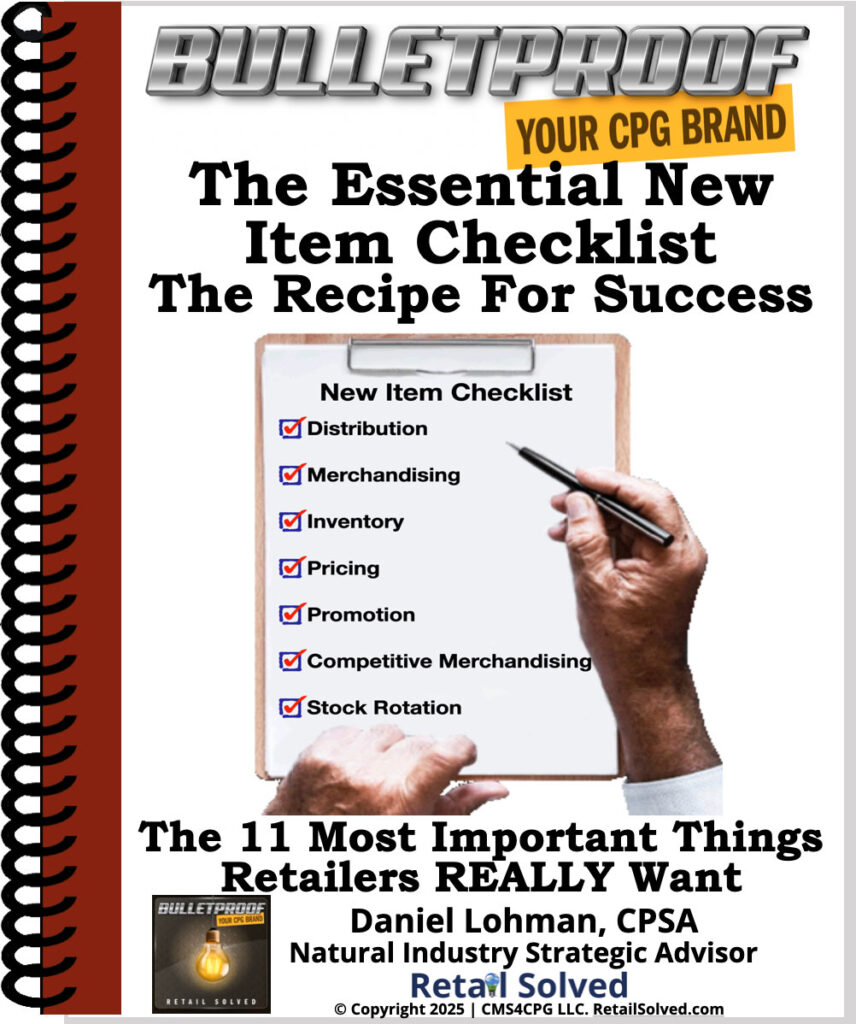
The Essential New Item Checklist – The Recipe For Success
Want A Competitive Edge? The Recipe For Success
New product innovation is the lifeblood of every brand. New products fuel sustainable growth, attract new shoppers and increase brand awareness. Learn the critical steps to get your product on more retailer’s shelves and into the hands of more shoppers. Maximizing your trade marketing can pour rocket fuel on your launch.
Image is the property of CMS4CPG LLC, distribution or reproduction is expressively prohibited.
